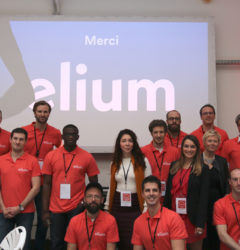05 Sep

(Update September 2020)
Elium is versatile software service that supports knowledge sharing and content distribution, both internally and with customers.
Since its inception, the system has been developing along with client needs and technological possibilities. After 13 years of evolution, today’s Elium is a highly tailor-able tool that forms the backbone of many excellent knowledge-management systems.
In your hands
Between its intuitive software and hands-on support team, the service provides everything a business needs to create a made-to-measure knowledge sharing system. From start-ups to multinationals, humanitarian work to cosmetic sales, our Eliumers are as diverse as their goals. We help managers to put together the right configuration of tools to fit their needs. This means that every one of our clients has a different Elium.
That is why, when asked how our service is used, we struggle to find a single answer. So, instead of telling you how to use Elium, we have outlined some of the most common ways that our clients are using theirs.
What is Elium for?
Clients come to us for a variety of reasons. But all of them aim at boosting business performance through better knowledge sharing and more efficient communication.
Increasingly, Eliumers are using their platform as a knowledge management tool to:
- Save time
- Facilitate collaboration
- Support flexibility
- Align teams
- Enhance company culture
Why? Research indicates that employees are more innovative and productive when they share their knowledge, communicate healthily, and have efficient processes to work with. This goes for individuals, teams, and organizations. But without the right infrastructure, colleagues are often unable or even unwilling to share their knowledge effectively.
There are a number of causes for this, and we will discuss below how our clients use Elium to address their own challenges. But disorganized information is an important issue for most companies.
Studies from Harvard Business School show that information overload is a rising problem for workers across the industries. Elium is essentially a way of organizing information and communication streams. Its main roles are to create a user-friendly knowledge base, improve communication, and enhance collaboration.
Get organized
Studies worldwide have shown that knowledge sharing initiatives have the power to boost overall employee productivity. For most, this starts with a knowledge-sharing system.
A knowledge base is** a **digital repository for company information. For many, establishing this base is one of the first steps to creating a *knowledge management system*. Elium’s **knowledge sharing software **extends the functionality of a knowledge base. It not only centralizes the information but, categorizes and streams it according to who needs it. Features such as multiple file formats, deep search functions, and a Q & A engine, keep knowledge current, trustworthy, and accessible. By syncing with Google, Microsoft, and other Workplace plugins, and integrating SAML2 SSO and SCIM authentication, it helps to incorporate knowledge-sharing into the company culture.
1. Save time
According to IDC data ‘the knowledge worker spends about 2.5 hours per day, or roughly 30% of the workday, searching for information.’ A report by McKinsey shows that they spend another 28% of their days reading and answering emails.
This is more than the equivalent of one worker’s wage spent on information searches. When employees are not putting their creative skills to use, but instead spend hours searching for difficult-to-find information, the company’s whole ethos is affected. This is why knowledge sharing matters.
Almost 60% of business managers who took part in the IDC survey considered time restraints and insufficient understanding of how to navigate the knowledge base as the main hindrances.
In addition to cutting down on email time, knowledge-sharing platforms can eliminate unnecessary meetings, and make it quicker and easier for employees to find the information they need.
Smart search
Elium’s smart search function makes it extremely easy for everyone in an organization to find the information they are looking for.
Structured data
Elium tailors templates for to each organization. They structure data as it is added to the knowledge base.
For example, some of our clients develop and sell products. In this case, the knowledge manager sets up product description templates specific to the type of product and scenario. To share information about a product, employees simply fill in the relevant product description template.
Once a knowledge manager sets up the system, it is very quick and easy for employees to input information into the knowledge data base. In fact, it soon becomes habitual.
Elium then streamlines the information according to the department, team and roles of the user. Knowledge then cascades. It indexes according to who needs it. This means that each person can find what they need as quickly as possible. They don’t waste time digging through old Slack and email threads.
Personalized workspace
While the company has a centralized Elium platform, each employee’s Elium is tailored exactly to their needs. Instead of an intranet that bombards users with all the company news as soon as they log in, Elium makes sure that the first things staff see are the things most relevant to them.
2. Facilitate collaboration
Since the 1990s, business leaders have understood the importance of collective intelligence. If the success of companies like Google isn’t enough, there has been overwhelming academic evidence that collaboration is one of the most important attributes of an enterprise.
But all too many leaders have learned that it is harder than it sounds, to facilitate collaboration. Some of the most common barriers to workplace collaboration are to do with disorganization, information hoarding, and knowledge deficits.
Organizing collaboration
When everyone in a team is clamouring to say their piece, the result is simply noise. That is why Elium provides the tools for highly structured collaborations. Elium organizes team work in such a way that every voice gets heard.
Elium’s a top-down structure makes it much easier to collaborate in a structured manner. Once they have set up their Elium permissions, managers can choose a space to publish their content, based on what contributions they want. This means that the right people will see it at the right time.
Encourage sharing
Many employees withhold information from colleagues – a phenomenon known as ‘knowledge hoarding’. According to research published in the Journal of Organizational Behavior, whether employees share depends very much on the structure of their job. Jobs offering more autonomy tend to promote more knowledge sharing, as do more cognitively complex tasks. When employees feel trusted and appreciated, they are also more likely to share.
Through tailored templates, Elium builds information sharing into employee’s jobs. Specific types of content are linked to specific spaces. For instance a “Competitor Card” will automatically be stored in the ‘Competition Analysis’ space. In this way, managers are sure that their marketers and salespeople will all automatically see new Competitor Card. Employers can check to make sure that they have seen it too!
Employees have more autonomy because they can access everything they need to get their jobs done without having to ask a coworker.
The system helps to create trust by giving employees the independence to work alone, while making collaboration easy. Managers can see what each worker contributes. So, that no one’s efforts at sharing go unnoticed, and no one has to put effort into making themselves visible. The platform allows colleagues to thank one another for sharing useful information.
Break down silos
According to a number of research papers examining the ‘silo effect’ in industries like pharmaceuticals and business corporations, information silos considerably decrease efficiency and profitability.
When colleagues don’t integrate or aggregate new information, they create an information or knowledge silo. This means information flows up and down but doesn’t cross departments or even teams. Silos restrict clarity of vision across the organization and hamper collaboration.
One of Elium’s core purposes is to dramatically upgrade the knowledge base and break down knowledge silos. It does this without making extra demands on employees. Instead, the system makes information easy to input, and organizes it in such a way that nothing is duplicated or lost.
3. Support flexibility
Flexibility is increasingly important for attracting and keeping talent, and maintaining employee engagement. The last decade has seen plenty of robust academic research suggesting that work flexibility is essential for business success. And that was before the Covid-19 pandemic. Of course, it has recently become more important than ever for managers to facilitate employees to work from home.
According to a study published in The Psychologist-Management Journal, employers who gave flexibility to their workers had eight times more employees who intended to remain with the organization and five times more highly engaged employees.
Elium stores everything in the cloud. This makes working from home extremely easy. Staff can get to work within seconds from anywhere that internet is available. All they have to do is log onto their Elium, and they will be instantly updated on everything they need to know about their ongoing projects, and get access to the company’s information.
Elium is accessible from phones, laptops, or tablets, and fully integrates tools like Slack and Teams. The mobile app is particularly useful for teams working in the field. Marketing teams, for example, use Elium to share photos of best practice or of competitors’ products.
When lock-down came into force, Elium made it possible for companies to keep going. Using the centralized platform, managers disseminated information about how they would be responding and shared work-from-home procedural information. Many even onboarded new staff remotely!
4. Alignment and engagement
Alignment and engagement depend on employees working with efficient processes. When an employee feels that their work is effective, they are more committed and do a better job. Conversely, a worker who feels they are wasting time will become frustrated.
One of the main ingredients for successful alignment and goal-oriented management is communication.
Elium makes communication easier and more efficient. It builds it into work processes so that nothing falls between the cracks. The platform allows managers to ensure that the right information reaches the right people at the right time.
A recent Gallup study found that organizations with highly engaged employees outperform competitors with less engaged workers by a vast margin of 147%. Research shows that productivity increases by 56% when employees understand how their work contributes to company objectives. Yet a mere 7% of employees today fully understand their company’s business strategies and their role in achieving company goals.
When teams work in silos, then their access to knowledge is curtailed no matter the knowledge management tools at their disposal. A knowledge-sharing culture is a positive work environment in which employees feel they can collaborate, work cross-functionally and genuinely get to know one another. That environment creates engaged teams that yield concrete returns.
5. Company identity
Engaging employees and encouraging sharing don’t just happen by acquiring search and categorization functions. A company needs a clear, strong culture. The last, but not least common, the reason why companies are choosing Elium is to draw all employees together around a strong company identity.
By providing a central, shared online space, Elium helps companies to articulate and disseminate an identity. That’s why we work hard to create a platform that fits with your organization’s character and helps draw all employees together into one story in which everyone has a role.
How will you use yours?
With a solution as adaptive as Elium, clients are often surprised what the platform can do for them. If you think your company could benefit from time-saving processes, better communication, more effective collaboration, and happier, more engaged staff, why not sign up for a free trial?
Our customer support team will guide you through the creation of your own made-to-measure platform.






